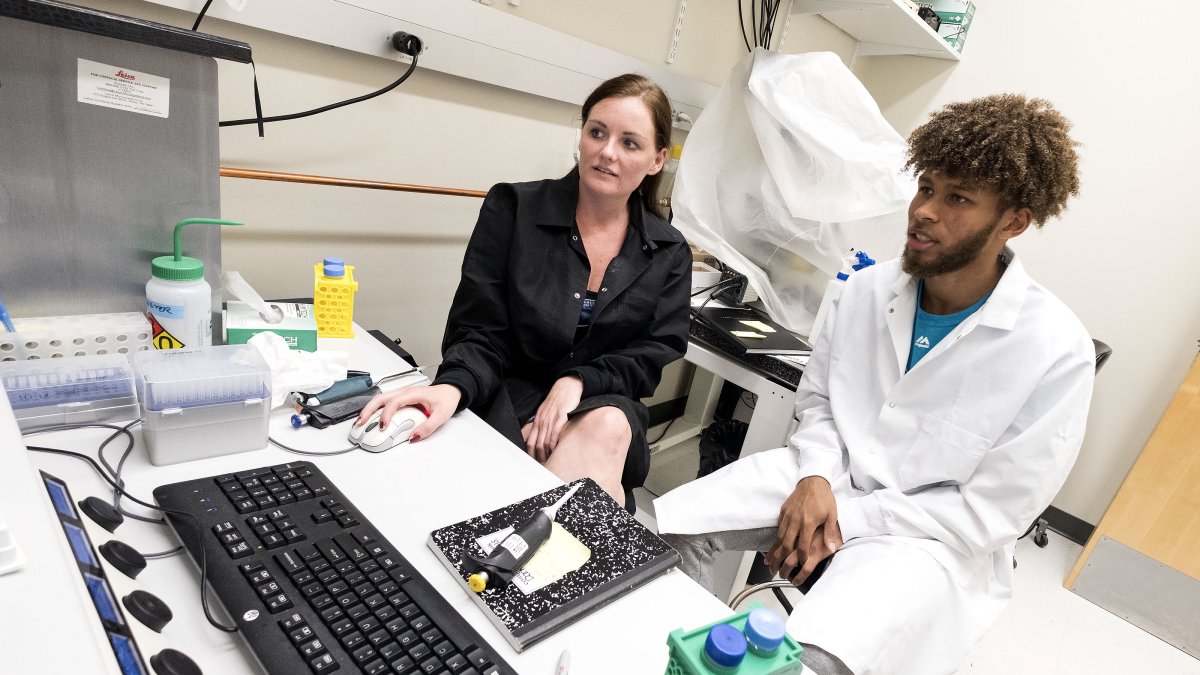Training a new wave of graduate researchers
The Summer Undergraduate Pipeline recruits rising seniors attending universities outside of North Carolina to train with faculty, graduate student and post-doctoral mentors.

For Keith Rogers and Sofía Valiente Suárez, summer has consisted of chemical formulas, beakers, pipettes and a deep dive into Carolina’s research databases.
While the rising seniors attend universities outside of North Carolina, both have spent the past 10 weeks living on campus and engaging with Carolina’s research community through the Summer Undergraduate Pipeline.
In its third year, the Summer Undergraduate Pipeline (SUP) is a recruitment initiative of the Graduate School’s Diversity & Student Success program.
SUP coordinates with 14 summer research programs at Carolina to provide research and professional development opportunities to undergraduates from around the world. While on campus, these students conduct their own research projects with faculty, graduate student and post-doctoral mentors.
The students also attend workshops on various topics, such as graduate school at Carolina, to prepare them for graduate school. Dean Steve Matson of The Graduate School also gives a workshop about preparing for the GRE.
Rogers, who attends Oakwood University in Huntsville, Alabama, said he enjoyed the personal statement workshop.
“With applying to graduate school this year, the workshop about how to write a personal statement was extremely helpful. I actually sat down and began working on my personal statement in the workshop and got a good headway on it.”
Rogers has also worked closely with his mentor Megan Webster, a third-year post-doctoral researcher in the Cystic Fibrosis and Pulmonary Diseases Research and Treatment Center.
“I think SUP is very useful and needed for undergraduates because if you only spend a short amount of time in the lab or just visit for a day or two, you don’t really get to experience how a lab is actually run,” said Webster.
Kathy Wood, co-director of Diversity & Student Success, said it is unique to pull together this many summer research programs at one institution with the purpose of training and transitioning students into graduate school.
“SUP allows undergraduates to preview what graduate school is going to look like while providing them resources and opportunities that they may not have at their home institutions,” said Wood.
For Valiente Suárez, who attends the University of Puerto Rico at Mayagüez and is interested in organometallic chemistry, having these resources at her fingertips has been an incredible experience.
“Back at my school, there are not a lot of resources. The easy access to scientific journals and the university libraries is helpful. The opportunity of working in a lab that has everything is also awesome.”
At the end of the summer, Rogers, Valiente Suárez and 139 other students will participate in an undergraduate research symposium hosted by SUP, where they will present their research to a broad audience of faculty, staff and students. This year’s symposium will be on July 26 from 9 a.m. to 12:30 p.m. in the Sonja Haynes Stone Center for Black Culture and History.
While Rogers and Valiente Suárez will be finishing college at their respective schools, both are applying to UNC-Chapel Hill for graduate school and hope to be future Tar Heels.
“I greatly appreciate participating in the SUP initiative this summer,” said Valiente Suárez. “You learn new techniques and new ways of thinking. You grow as a scientist, but you also grow as a person.”




